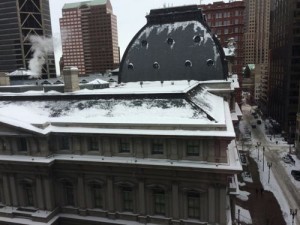Controversial Weather

How about this weather? The cold air was something! The why is controversial though; some argue climate change may have contributed to the bitter cold, while others think the cold air disproves global warming:
Arctic warming is altering the heat balance between the North Pole and the equator, which is what drives the strong current of upper level winds in the northern hemisphere commonly known as the jet stream. Some studies show that if that balance is altered then some types of extreme weather events become more likely to occur. (climatecentral.org)
Sen. Jim Inhofe (R-Okla.) took to the Senate floor Monday to describe the idea of human-induced climate change as “almost laughable,” citing this week’s cold snap and the recent stranding of a Russian research ship in the Antarctic ice. Inhofe has plowed this ground before: After snow buried D.C. in early 2010, his family built an igloo near the Capitol with a sign reading, “Al Gore’s new home.” (politico)
I think it’s sad when a US Senator proudly displays his ignorance.
No scientist argues that long-term global warming means that we won’t still experience winter, even bitterly cold winters like this year’s has become. The changes to the climate that scientists who are concerned about global warming point out are exactly that: long-term. Individual weather events don’t mean that the trend isn’t taking place.
(It’s also important to point out that the United States makes up less than 2 percent of the Earth’s surface. So even when we see heavy snow events and blasts of Arctic air like this week’s, there are many parts of the world experiencing record heat, such as Australia.) (weather.com)
Some local land will be part of a study on Climate Change:
In November, the plot, at the university’s Tyson Research Center, situated between Lone Elk and West Tyson county parks near Eureka, was named a Smithsonian Institution Global Earth Observatory.
It is now part of a network of 52 other forest plots scattered around the world being used to study climate change and biodiversity. (stltoday)
What are your thoughts?
— Steve Patterson
It’s winter, it gets cold, duh! Climate change / global warming is a long-term trend, something that can only be tracked over years and decades. One winter blast or one summer heat wave proves very little in a vacuum.
It’s not just winter! http://www.dailymotion.com/video/x19df8h_cable-highlights-bill-nye-schools-climate-change-deniers_news
Grandstanding by politicians to score political points is so tacky.
Well, Inhofe is a fool, and a whore to the oil, etc. extraction and refining industries, so there’s that. But cold weather neither proves nor disproves the global climate catastrophe. But the established trends we are seeing do indicate the type of weather we will get in the future, as well as its severity and capriciousness. Things won’t be quite as predictable as when our atmosphere was more stable, and minus the gigatons of extra CO2.
Pointing to cold weather to disprove catastrophic climate change is as pointless as pointing to extreme weather to prove catastrophic climate change. Whenever there’s a hurricane, tornado, storm, drought, or whatever, then eventually somebody pops up to blame climate change. And whenever there’s a cold snap or a big snowstorm, somebody pops up to taunt climate change activists.
Neither one proves or disproves the idea that the weather or climate will get increasingly “worse” (an incredibly nebulous concept) until the planet reaches horrible catastrophe. But regardless of whether it’s snowstorm, heat wave, hurricane or tornado, I know that cheap energy better enables people to prepare and to react. For example, it’s better for people in the aftermath of a snowstorm or hurricane to be able to cheaply power their generators, if needed. Any sort of policy that makes it more expensive to use, extract, or refine fossil fuels is going to make it more costly for people to react to near-term weather events, and it’s unreasonable to argue that such a policy could offset those costs by appreciably changing the climate in the near-term.
To me, it seems likely that mankind may be affecting the climate both through greenhouse gas emissions (warming) and via aerosols in the form of air pollution (cooling) — especially from China and India, with their huge populations and relatively dirty air. Nature’s own effects can also be overpowering; the all time low temp for St. Louis of -22 F was set in January, 1884, and it seems quite possible, even likely, that this was related to the massive Krakatoa eruption in 1883 that injected enormous quantities of dust into the upper atmosphere. I tend to be a pessimist in most things where humans are involved and think that we also could still have a nuclear winter at some point as the result of a future nuclear war between India and Pakistan, and, in fact, am frankly surprised that particular event hasn’t occurred already. In any event, sea levels do appear to now be rising somewhat faster than they have in previous centuries, and regardless of whether man is contributing to that rise or not, I think it bodes poorly in the future for those living in areas at or close to sea level elevation worldwide.